phati'tude, a multicultural experience is making cultural connections through literature . . . bringing people together

phati’tude Literary Magazine (PLM), founded in 1997, is an award-winning quarterly publication featuring themed issues that showcase outstanding poetry, prose, short stories, articles, interviews, literary criticism, book reviews, and biographical profiles by both established and emerging poets, writers, and artists. Although its original mission was to highlight works by Native American, African, Asian, Latin@, and Arab authors, the magazine has always embraced the idea that all writers are multicultural, and thus remains dedicated to featuring works from writers of diverse cultural backgrounds and sexual orientations.
What exactly is phati’tude Literary Magazine? The name was created from slang terms: “phat” meaning “emphatic” and “tude” as a shortened form of “attitude.” The goal was to foster an “emphatic attitude” toward contemporary literature by continuing the literary arts programming initiated at the Langston Hughes Community Library & Cultural Center (Queens Library) in Corona, New York, during the early 1990s. Published by The Intercultural Alliance of Artists & Scholars, Inc. (IAAS), a New York-based nonprofit organization dedicated to promoting multicultural literature and literacy, PLM was in circulation from 1997 to 2012.
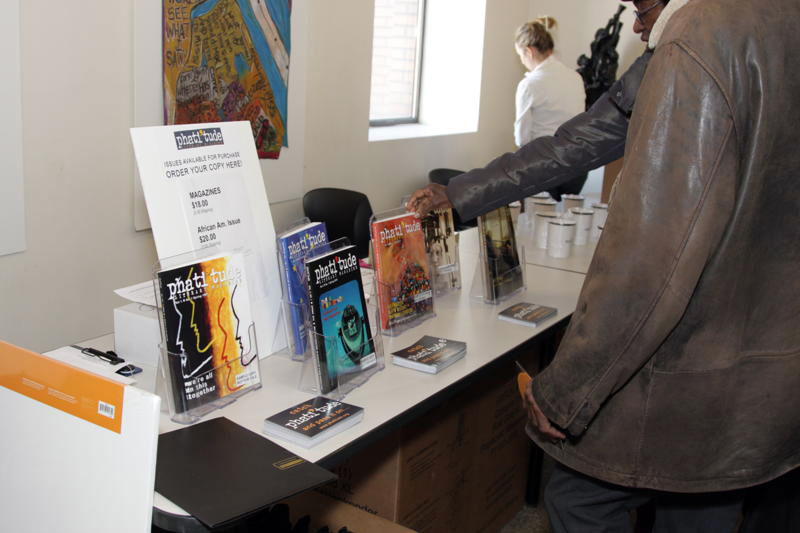
Most journals were produced in a 6″×9″ size, featured minimal graphics, and targeted primarily scholars, publishers, and professors seeking tenure. In contrast, PLM debuted as an 8″×10″ perfect-bound book with a glossy, full-color cover and included graphics and artwork on every page. We were among the pioneers in using desktop publishing and establishing an online presence. PLM was the first to label itself a “magazine” rather than a journal and published writers beyond the Western literary tradition. We developed literary programs in the New York/New Jersey area involving many writers associated with PLM, effectively creating a close-knit literary community.
PLM has showcased an impressive array of poets and writers, including several poet laureates such as Rita Dove, Lawson Fusao Inada, devorah major, and Everett Hoagland; emerging talents like Silas Parry, Angelo Nikolopoulos, Devi Lockwood, and Samantha Le; as well as established authors including Sonia Sanchez, Amiri Baraka, Patricia Smith, Eileen Myles, Joseph Bruchac, Heid Erdrich, Tara Betts, Richard Kostelantz, Purvi Shah, Eileen Tabios, Edward Snow, Gina Valdés, Virgil Suarez, and Edward Field.
Our core group of poets and supporters included Jesus Papoleto Meléndez, David Henderson, Andrew P. Jackson (Sekou Molefi Baako), Shirley Bradley LeFlore, Stephanie Agosto, D. H. Melhem, Regie Cabico, Ammiel Alcalay, Steve Cannon, Bob Holman, Meena Alexander, Tony Medina, Louis Reyes Rivera, Mary McLaughlin Slechta, among others. Our cover art has been contributed by our art director Lorraine Miller and artists such as Ruben Acosta, Edward L. Rubin, Danny Simmons, and Kristi Taylor.
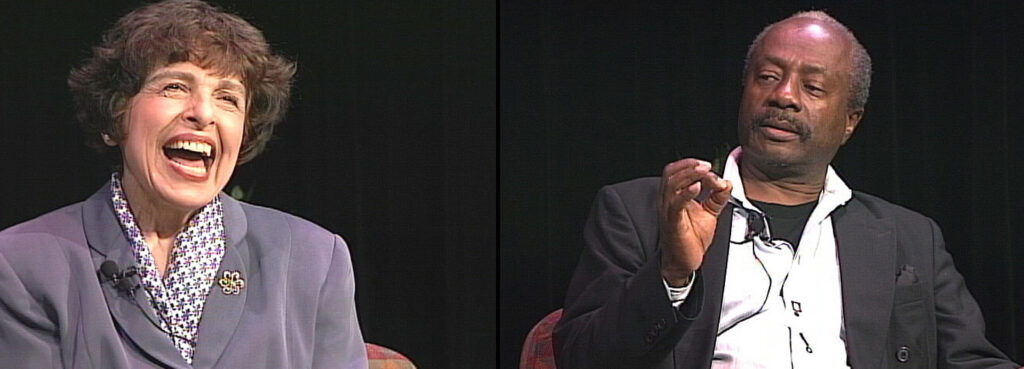
The late professor, scholar, poet, and author, D.H. Melham (l), and poet and author David Henderson (r), both vigorously promoted multiculturalism, especially in the poetry community.
Unintentionally, PLM has documented the literary community by publishing poets and writers who were then emerging and have since become established, as well as well-known authors who have passed away. This collection has evolved into a historical record—a tribute to the poets and writers featured in PLM who inspire everyone, especially young people, to enjoy reading and to develop a deeper appreciation for the invaluable contributions of those who have advanced humanity’s social and cultural progress.
It’s no secret that the economics of single-title, independent magazine publishing is tough. With escalating print costs, we ceased publication in 2001. When print-on-demand afforded lower publishing costs, we decided to bring back PLM in 2010. Although publication costs were far lower than traditional publishing, PLM became a runaway train of several hundred pages, and as a result lacked the editorial and marketing support needed to maintain and grow the magazine, so we ceased publication in 2012. But even after all of these years, PLM remains an invaluable document and teaching tool comprised of some of the best established and emergent writers at the turn of the century. The ten published issues are as timely as when we first published them, and remain relevant in the public sphere. While some of these great poets and writers have passed on, their poetry lives on within the pages of PLM.
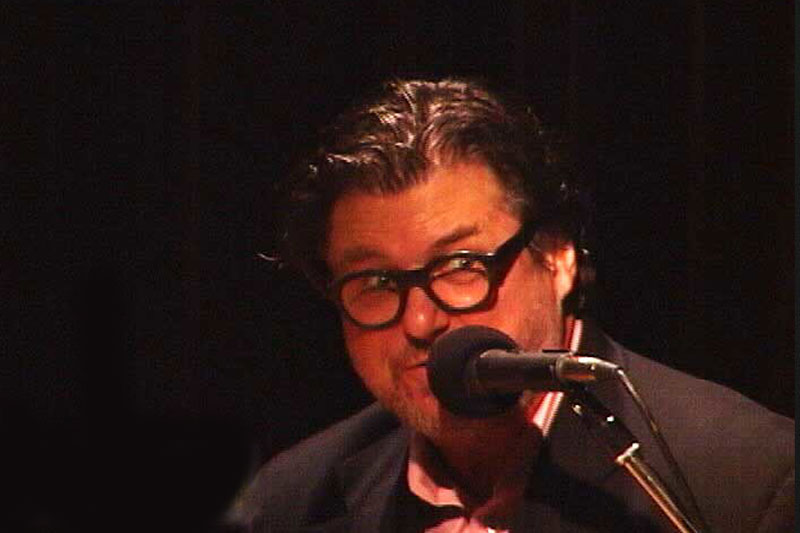
Poet, professor and poet-entrepreneur Bob Holman has been a steadfast supporter of phati’tude since its inception through the Bowery Poetry Club in New York City.
Since the initial publication of PLM, the world has seemingly become more diverse, and numerous media have emerged and evolved to help us understand the cultures of others; however, there is still work that needs to be done. Reflecting on PLM from many years ago, we interacted with prominent professors and academics such as Carl A. Grant, Christine E. Sleeter, Sonia Nieto, and notably, James A. Banks, who is regarded as the “father of multicultural education” due to his contributions to social justice in education.
E. D. Hirsch and Allan Bloom were important figures credited for fueling the “culture wars”—intense public debates over American education, intellectual standards, and core cultural values. In 1987, Hirsch, an educator, literary critic, and education theorist, published Cultural Literacy: What Every American Needs to Know, which became a national bestseller, reaching number two on The New York Times Bestseller list. Hirsch’s book was frequently reviewed and discussed alongside another bestselling education book released around the same time, The Closing of the American Mind by Bloom, a philosopher, classicist, and academic. Both books convinced many readers that American education faced significant issues.
While Hirsch’s work sparked a growing movement advocating for prescriptive cultural literacy and educational standards, Bloom, heavily influenced by philosopher Friedrich Nietzsche, argued that American higher education had failed democracy by promoting moral and intellectual relativism, which paradoxically resulted in a society with closed, uncritical, and impoverished minds. My circle of poets, writers, and scholars eagerly read these books, treating them as a standard reference on the advantages and disadvantages of multiculturalism, applauding Hirsch’s insight while pointing out Bloom’s flaws.
By the late 1990s, multicultural and postcolonial theorists Henry Louis Gates Jr. and Ronald Takaki, who advocated for cultural diversity and pluralism within a liberal framework, focused on making universities a meeting ground for different perspectives to foster greater cultural diversity. These changes have especially benefited American literature—though sometimes only as token additions alongside European and American classics—leading to significant revisions of the canon, partly because American literature never had a firmly established canon to begin with.
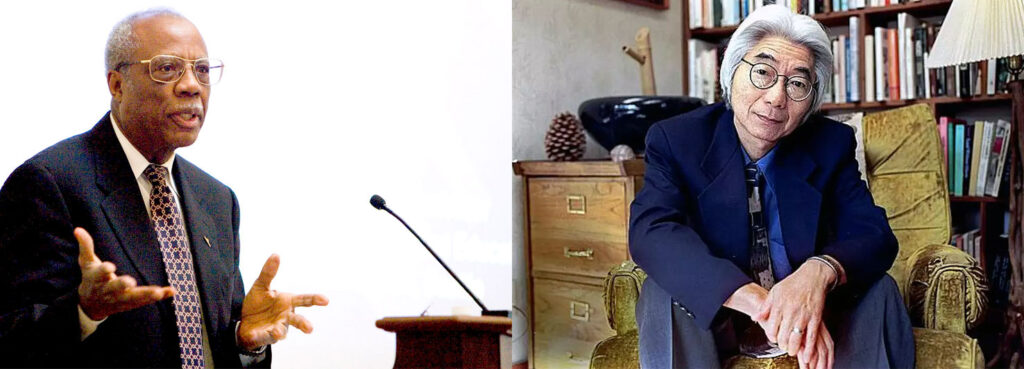
James A. Banks (l) and the late Ronald Takaki (r) were both preeminent scholars and authors who vigorously promoted multiculturalism and diversity in education and everyday life.
Over time, these discussions became more personal and urgent, prompting me to take action. Two key figures in the creation of PLM were Andrew P. Jackson (Sekou Molefi Baako) and the late poet, teacher, artist, and activist Louis Reyes Rivera. Jackson, who was then the Executive Director of the Langston Hughes Community Library and Cultural Center (Queens Library) in New York, hired me to organize literary events at the library. I was introduced to Rivera by the poet Jesús Papoleto Meléndez, and I arranged for both of them to appear at my first event at the library. This experience marked the beginning of my connections with the literary community and ultimately led to the founding of PLM.
I should mention that over time, Rivera became both a friend and mentor to me, as he was to many others in the literary community. Rivera, who fully supported PLM and my other literary endeavors, often challenged the validity of the multicultural argument and my enthusiasm for it. Openly committed to social justice, Rivera believed that while debates over a multicultural curriculum were significant, the real goal was to ensure its inclusion within a core liberal arts curriculum. This curriculum should require a comprehensive understanding of European art and history, taught with the same depth and fairness as that of African Americans and Latinos in the Americas, along with the art and history of Egypt, India, China, West Africa, and Mesoamerica. In essence, he argued that students should not only learn to recognize Picasso’s style but also be equally encouraged to appreciate the 2,000-year-old West African traditions that influenced Picasso himself (Prattler 1993, Volume 59, Issue 5, page 17). Clearly, PLM was not a vanity project; it was well-thought-out, reflecting contemporary culture and deeply rooted in historical significance.
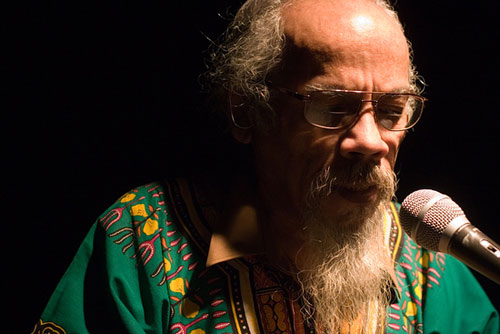
Mentor, poet, and professor Louis Reyes Rivera, who died in 2012.
Today, it seems we are loudly dividing rather than coming together. We are all “many,” but not “one.” Consider the decline of humanities programs in public schools, colleges, universities, and our broader culture. Consider the rise of anti-immigrant and anti-refugee xenophobia from those who want America to be “white again,” even though it never truly was. This situation affects how we teach American history, the books we choose to read, and what the Western canon actually represents—or misrepresents.
For our literature to truly reflect who we are as Americans, it is essential to include culturally diverse works in our education and daily lives. Learning about different cultures is crucial for becoming a fully developed human being, as it broadens our perspective, deepens our empathy, and enhances our ability to connect and collaborate with others. I would also argue that the humanities play a key role in democracy because they enable us to transcend mere tolerance to a genuine appreciation of the diversity of human experiences. I believed this then, and I still believe it now, especially as we face a rise in nationalist backlash.
This is why publications such as PLM, past and present, which question conventional notions of how literature “ought” to be written, are increasingly vital. It’s also the reason I urge people to check out phati’tude Literary Magazine (available on Amazon), to help promote the continued exploration and revival of literature that encourages self-awareness, and more importantly, to see yourself reflected in these works.
— Gabrielle David, Former Editor-in-Chief

